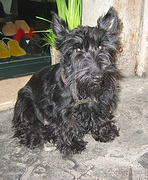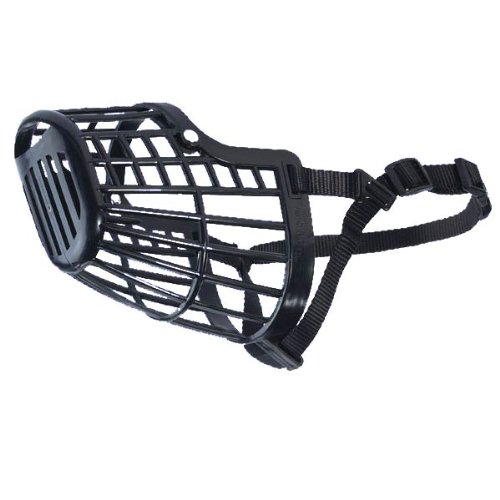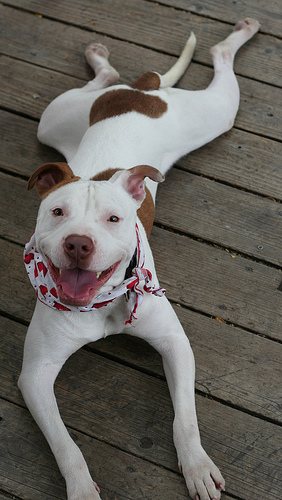Make your life and that of your dog a more pleasant journey together by taking time to train them to be good citizens in their environment. You don't feel up to the task or don't have time for trial and error? You are not alone. But you want a good mannered dog, so the next step is to find help in the form of a dog trainer. But how do you make sure that you are selecting the right trainer?
Your puppy begins to learn from birth…first from her mother and littermates then from the breeder (if you have selected a breeder carefully the pup will have invaluable training before she is in your hands) and finally, in short sessions, from you from the moment you bring her home. But when should the formal training begin?
One of the first things to consider is at what age do you begin formal training? A puppy can begin a puppy training class between 9-12 weeks old. This is optimal time to socialize a pup. Prior to classes she should have her first series of vaccinations and Bordatella (kennel cough vaccination) and a negative stool sample. Check with the trainer for additional requirements. You will need vet confirmation. (If the trainer doesn't ask for it from you, he didn't ask for it from the other owners. Do you want to expose your dog to those possibilities? This might not be the best choice of trainers.) Also, a trainer will most likely want the puppy to be used to a collar and leash. However this may be something that he is going to teach.
How do you find a trainer? You want to select one who has a good reputation. Fist, ask your vet for recommendations. With any trainer you are considering, talk with people who have actually had pets in the class. A reputable trainer should be able to put you in touch with them. Of course the yellow pages will list people, but check them out thoroughly. Calling one's self a dog trainer doesn't necessarily mean that one is well trained.
Determine how long the trainer has been doing this business. Is he a member of any dog training associations? Is he qualified as an evaluator in the American Kennel Club Good Citizen Program? What training does the trainer have? Can the trainer communicate well with you and teach you what you need to know to maintain or extend the training?
You will want to observe a potential trainer in action. One thing to watch for is physical contact. There is no room for negative contact, i.e. hitting or spanking. The result will be a dog that either cowers away from you or becomes aggressive. A dog's way of saying "stop that" will be to take the hitting hand in her mouth…then she is tagged a vicious dog. The cycle will have begun. How does the trainer discipline the dog? Remember, disapproval of an action should come as the action is happening, not after the fact. Discipline to a dog is denial of attention or denial of reward. Distraction from the poor behavior and guidance into a positive action for which she can receive praise is much more desirable and effective. Corporal punishment has no place in a good trainer's repertoire. Avoid any trainer who uses negative physical force as a training method.
Watch for positive touching; as a means of reassurance, or to reinforce approval. This is one sign of a good trainer who understands dog behavior. Listen to the tone of voice the trainer uses; is it firm but not harsh and demeaning?
Remember, giving your dog to someone to "fix" is not the solution for good training. You need to be part of the training process. You need to continue to interact with the dog in the home environment and the trainer should be guiding you in that activity.
You may want to go beyond this initial training, perhaps, into a more specialized training such as rescue work or pet therapy. To do this, be sure you know exactly what it is you are expecting from the training and that you have discussed it with the trainer to be certain this is in his area of expertise. If it is not, ask for recommendations for a trainer in that area.
Some types of classes offered are:
1) Puppy Training (up to 5 months old): This may include socialization, walking on a leash without pulling, housetraining, barking abatement…
2) Basic Obedience (at least 5 months old): This is a continuation of puppy training plus common commands such as heel, sit, stay, come, etc. To graduate from basic obedience a dog must pass the 10-item test of the American Kennel Club Good Citizen Program.
3) Advanced Obedience: Do you wish to show your dog in competition? You should definitely continue to the advanced obedience. This doesn't mean that you should not consider this class even if you do not plan on showing. The additional training will simply result in a nicer, well-behaved companion.
4) Conformation: This is for the dog that is going to be presented in the show ring. It addresses looks and movement in the ring while showing.
5) Agility classes: This can be for fun or for show. The dog loves it and you both get exercise! You don't want that much exercise? Find a handler. (Wouldn't this be a great positive activity for a young teenager?)
6) Therapy Dog Training: Dogs are trained and evaluated to provide comfort and companionship to shut-ins. This is a very rewarding activity for you and your dog. (Also, another great activity in which to involve children.)
7) Sport and field dog training usually focuses on a specific kind of activity, such as retrieving or pointing. There are some breeds for which this kind of activity is natural and just needs the proper training. Even if you are not a hunter, the field trials may fantastic fun for the dog!
8) Search and Rescue: If you are interested in this type of training, join an SAR group. They train the dog.

 Scottish Terrier Breeder Interview: Cindy Cooke Tells Us About Scotties
Scottish Terrier Breeder Interview
Cindy Cooke has been wor
Scottish Terrier Breeder Interview: Cindy Cooke Tells Us About Scotties
Scottish Terrier Breeder Interview
Cindy Cooke has been wor
 Tips On How To House Train A Puppy
Credit: Humane Society Of Greater Rochester v
Tips On How To House Train A Puppy
Credit: Humane Society Of Greater Rochester v
 Dog Muzzle
If you are unsure about your
Dog Muzzle
If you are unsure about your
 13 Unusual Things You Didnt Know Your Dog Really Enjoys
There are a lot of things th
13 Unusual Things You Didnt Know Your Dog Really Enjoys
There are a lot of things th
 10 Reasons To Foster A Dog
10 Reasons To Foster A Dog
If you抎 like to make a re
10 Reasons To Foster A Dog
10 Reasons To Foster A Dog
If you抎 like to make a re